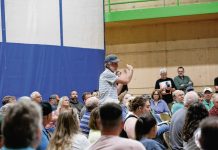The city of Columbus is planning to purchase and transform FairOaks Mall into a year-round community recreational and sports tourism complex, partnering with Columbus Regional Health and the Heritage Fund — The Community Foundation of Bartholomew County in the effort.
For at least the next three years, retail businesses operating in the mall — which opened in 1990 — will have an opportunity to be part of the transformation, Mayor Jim Lienhoop said. All existing tenant leases will be honored, he said.
Lienhoop said the city’s move to acquire the property represented taking an opportunity when it became available, rather than waiting for the property’s continuing decline to develop into an even more dire situation.
“We are being a little proactive rather than reactive,” Lienhoop said of the mall property, which lost anchor stores J.C. Penney and Carson’s within the past 13 months and has seen significantly less foot and vehicle traffic than when the facility opened three decades ago.
[sc:text-divider text-divider-title=”Story continues below gallery” ]
The city has agreed to purchase the 35.36-acre property at 25th Street and Central Avenue for $5.9 million, which it expects to finalize by December, the mayor said.
If approved by the Columbus City Council, the city will be the majority partner, putting up $4,087,500 or 75 percent of the property’s $5,450,000 appraised value. The hospital system will provide $1,362,500 or 25 percent of the appraised value. The Heritage Fund has committed to providing $450,000, which is the difference between the selling price and the appraised value.
The city is prevented by state statute from paying more than the appraised value, Lienhoop said.
The property could include an indoor recreation center within the mall and an air-supported domed facility developed elsewhere on the site to house indoor softball, soccer, volleyball and other sports, creating a year-round community recreational asset and sports tourism magnet.
The mall currently has about 400,000 square feet under roof with 18 tenants, including anchor Dunham Sports, several restaurants, Bath & Body Works and Payless Shoes, as well as non-retail tenants such as Cummins Inc. and a community theater.
Tenants were notified Wednesday and Thursday by representatives of the mall about the pending sale, city officials said.
All leases will be honored for at least three years, Lienhoop said, although the city will allow tenants to negotiate an exit strategy if they wish.
The city hopes that at least some of them will stay as mall tenants, especially if their business plan would fit with the structure’s proposed new use as a health, recreational and sports complex. For example, restaurants might consider staying if visitors increase with sports tourism opportunities and the meeting space provides opportunities.
City officials said they hoped to work with Dunham officials to consider staying in their location as a sports and recreation complex might generate more foot traffic for the store in the future.
Parks department use
Acquisition of the mall property is being tied to the city’s future plans for Donner Center, a 71-year-old facility that the city has determined may not be worth a renovation at this point.
Donner Center houses the parks department administrative offices, provides community meeting space and supports Donner Aquatic Center, an outdoor swimming complex.
Part of the city’s five-year parks master plan released in 2017 identified the need for a strategy change from the city’s 1960s-style parks system to something more with the times, parks and recreation director Mark Jones said.
Part of those new expectations is the city providing indoor recreational facilities appearing to a wide range of ages and interests, year-round.
Lienhoop said in looking at accommodating that need, two of the city’s biggest parks, Clifty and Mill Race, have flooding issues, and Lincoln — across 25th Street from the mall — is already used heavily for softball tournaments and other events.
“Donner has a significant footprint in a residential area,” Lienhoop said. “Residents like the woods and the feel of the area. We don’t want to increase the traffic there.”
When talking with Columbus Area Visitors Center officials, the city learned it is in good shape in the sports tourism business in the spring through fall, but lacks opportunities December through April.
With the closing and demolition of the Clarion Hotel and Conference Center earlier this year on the city’s west side, meeting facilities have come at a premium with use of The Commons downtown increasing significantly.
“Part of what we’re doing is weaving together several different threads of this,” Lienhoop said.
Noting that the announcement was step one of a hundreds-of-steps process, Lienhoop said one of the ideas being considered is to move the parks administrative offices out of Donner and into vacant mall space, such as the former J.C. Penney store, which is open.
Donner would then be converted solely into an aquatic center, possibly even demolishing the administrative area and meeting space and expanding pool offerings there, such as locker rooms, restrooms and concessions, he said.
With the FairOaks property, the city would marry the two needs for an indoor recreational facility and meeting and office space into one facility.
Also being considered are indoor soccer competition fields surrounded by a track, indoor softball fields, room for indoor hardwood court sports such as basketball and volleyball and also space for fitness and indoor recreation.
Hospital plans
Columbus Regional Hospital was approached about three to four months ago by the city about partnering on the project, said Jim Bickel, CRH president and CEO.
The partnership and planning for health and recreation-related activities seemed to be a natural alignment for hospital services and offers another chance to work further upstream in the health care continuum in the prevention area, he said.
Collaborating on a fitness center, sports medicine opportunities and other ideas would fit with the concept the city is considering, he said.
The location, which is eight blocks from the hospital’s 17th Street campus, also offers an opportunity for the hospital’s master planning and a place to expand near the hospital, but off the landlocked hospital site.
“This gives us close proximity to the hospital campus but an opportunity to expand in a more cost-effective manner — it gives us some cost-effective options,” he said. “It aligns conceptually.”
Bickel said the mall property would not impact what Columbus Regional is considering on 800 acres it purchased in March on the west side of Columbus for future expansion.
Development of that site is 5 to 10 years out, he said.
“We still have needs today,” Bickel said.
Organizational structure
There are several organizational steps being put into place as the city enters the first few months of finalizing the sale and taking over ownership of the property.
The city needs to hire a property manager to oversee the property, which will essentially operate unchanged for all of 2019, unless a tenant wishes to negotiate out of their lease following the sale, Lienhoop said. The mall is currently being managed by an Indianapolis realty firm.
The city is also planning on hiring a site plan consultant to determine a master plan of how its vision for the property might be realized, which will include public-input sessions seeking ideas and suggestions, the mayor said. In the interim, the mall will continue to operate with current retail functions in place.
The city is working with Tom Brosey, a retired Cummins Inc. executive as a potential project manager for the mall site once the acquisition is completed, Lienhoop said. Brosey has served as interim director of the Bartholomew County Historical Society and has served as director of business operations at Foundation for Youth; co-founder of Mission Management Services of Columbus; and was 2013 campaign chairman for the United Way of Bartholomew County.
An oversight board may need to be formed with representatives of the city, parks department, hospital and Heritage Fund in the future, the mayor said.
If the sale goes through, the FairOaks project will be a huge addition to a long list of ongoing projects that the city has on its plate since Lienhoop took office.
The city is working with the Indiana Department of Transportation to build a railroad overpass over the State Road 46/State Road 11 railroad crossing, partnering with the hospital and other groups on substance abuse prevention programs, working on Envision Columbus, a visioning plan for downtown, and bringing the Indiana University Masters in Architecture program to the former Republic building downtown.
Lienhoop said while city employees are working on a large number of projects, the city had to take advantage of the opportunity when the mall owners agreed to sell.
“We can’t pass up the opportunity because it doesn’t fit our plans right now,” he said. “Columbus is really a fairly small place and you can get to just about everything in a few minutes,” he said. “This is a chance to offer added recreational activities within walking distance for many people.”
The project in some ways relates to Envision Columbus, which is taking ideas from the public to create an enhanced downtown experience for residents and visitors.
Creating the recreational and sports complex near workplaces and near the center of Columbus, 25th and Central, augments that idea, Lienhoop said.
“This will enhance Columbus as a community people want to live in,” he said.
Money considerations
Columbus’ sports tourism efforts bring in an estimated $12 million economic impact to the city in the summer months, and the FairOaks project could help the city add to that total, Jones said.
The property currently generates $140,000 in property taxes for the city. But without an improvement in the mall’s fortunes, the property value and tax revenues would continue to drop in the future, Lienhoop said.
Any retail that stays in the facility would remain taxable, he said. And if the sports tourism aspect of the project takes off, as city officials hope, the windfall from that in user and rental fees could offset the property tax losses of the city owning the facility, he said.
In addition to out-of-town rentals, local teams would be able to use the facility as practice space. The mall is close in proximity to all three of Columbus’ high schools, Jones said.
Adding meeting space also offers an opportunity in potential rental income, particularly if the space includes multi-use capabilities, such as smaller spaces for meetings but larger spaces that could be used for conferences.
Tracy Souza, Heritage Fund president and CEO, said the financial support from the community foundation came out of the compelling reasons laid out by Lienhoop and Bickel for the project.
The Heritage Fund Capital Fund grant for $450,000 supports the opportunity for a centralized recreational/wellness pocket of the city that offers something for everyone, Souza said.
The proximity of the Hamilton Community Center & Ice Arena and the Lincoln Park Softball Complex, across the street from the mall, are important to new parks department offices and a potential indoor facility, she said.
“The project speaks to younger families with children in sports, to those accessing wellness therapies and programming as well as adding an important component to our sports tourism initiatives,” Souza said.
The foundation’s executive committee, comprised of Board Chair Tony Gambaiani, Tom Harmon, Alice Johnson, Tom Vujovich, Matt Kirr, Tobi Herron, and Diane Doup, convened in one day to approve the grant, Souza said.
[sc:pullout-title pullout-title=”Creative mall reuses” ][sc:pullout-text-begin]
Mark Jones, Columbus Parks and Recreation director, provided a list of some creative uses for dying mall space around the country:
- Hickory Hollow Mall in Antioch, Tennessee became Global Mall at the Crossings and now includes a practice ice skating rink for the Nashville Predators, a satellite campus for Nashville State Community College, and a library in the building’s remaining space.
- 100 Oaks Mall, Nashville, Tennessee, repurposed into a medical center
- Cinderella City Mall in Englewood, Colorado, a 55-acre development that now includes a light rail station, city government offices, residential units, retail, a library and an art museum
- Windsor Park Mall in San Antonio, Texas, now home to a startup tech company, Rackspace, which has drawn in retail and residential projects to a previously crime-ridden location.
- Villa Italia Mall in Lakewood, Colorado, 900,000 square feet of retail space that is now 95 percent occupied. It is comprised of an open-air mall, offices, residential units, a theater, green space and a public arts program. Belmar generates $17 million a year in tax revenue for Lakewood.
[sc:pullout-text-end][sc:pullout-title pullout-title=”By the numbers” ][sc:pullout-text-begin]
Purchase price breakdown
$5,450,000: Average of appraised value of the FairOaks Mall by Pillar Valuation and Gregory Watts
$5,900,000: Purchase price for FairOaks Mall to be paid by the city, Columbus Regional Health and the Heritage Fund — The Community Foundation of Bartholomew County.
$4,087,500: City’s portion of the purchase price for the mall property, representing 75 percent of the cost.
$1,362,500: Columbus Regional Health’s portion of the purchase price for the mall property, presenting 25 percent of the cost.
$450,000: Capital Grant from the Heritage Fund supporting the purchase of the mall property.
City’s share of the purchase price
$2,000,000: County Economic Development Income Tax Fund, with a 2017 year-end balance of $3,507,771
$500,000: Columbus Parks and Recreation general fund, with a 2017 year-end balance of $2,602,059
$500,000: City Rainy Day Fund, with a 2017 year-end balance of $3,979,763
$1,087,500: City general fund, with a 2017 year-end balance of $25,513,893
Source: City of Columbus
[sc:pullout-text-end][sc:pullout-title pullout-title=”Development approval steps” ][sc:pullout-text-begin]
- Letter of intent, completed
- Formal offer to owner which meets Indiana Code legal requirements, subject to Columbus City Council and Columbus Regional Health Board of Trustees approval
- Resolution by Columbus City Council authorizing purchase, pursuant to terms of the purchase agreement.
- Purchase agreement approval by Columbus Board of Public Works and Safety
- Resolution by Columbus Parks Board for any funds appropriated from the Parks Reserve Fund
- Approval of city ordinances appropriating city funds for purchase, in readings from two consecutive City Council meetings.
- Joint Venture/Partnership agreement approved by the Board of Public Works and Safety
- Other governmental body approval as determined to be necessary
[sc:pullout-text-end][sc:pullout-title pullout-title=”About the property” ][sc:pullout-text-begin]
FairOaks Mall is zoned CR, commercial regional, which includes large retail and hospitals. The various proposed uses are either permitted or conditional in the CR zoning district.
For example, a community center is a permitted use, but an athletic complex and a conference center are conditional uses. Conditional uses are subject to the case-by-case approval of the Board of Zoning Appeals.
Current owner of the mall is New FairOaks Mall Owner LLC. The deal with the city was agreed to by a key company executive, Yeheskel Frankel of Lakewood, N.J. Frankel’s group bought the mall — which was in foreclosure — in January 2014 for $550,000, a fraction of the assessed value at the time.
[sc:pullout-text-end][sc:pullout-title pullout-title=”What’s inside” ][sc:pullout-text-begin]
- New home for city parks department, Page A4
- What’s operating in FairOaks Mall today, Page A5
- Redevelopment partners, Page A5
[sc:pullout-text-end]




